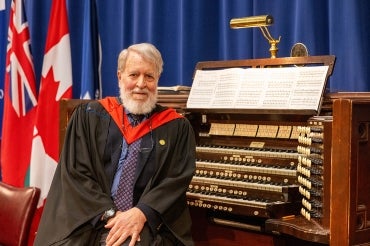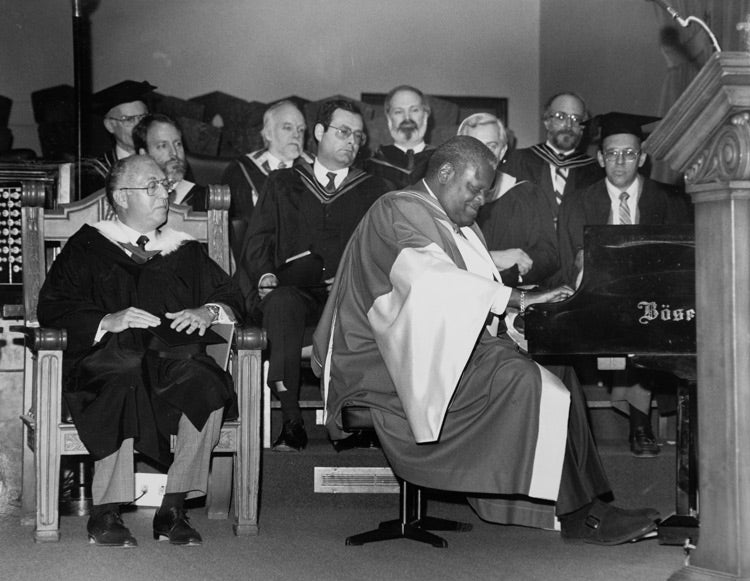The man behind the music: U of T’s official organist retires after 45 years

John Tuttle, who was first appointed U of T’s university organist in 1979, began playing the piano at age five and took up the organ at age 15 (photo by Lisa Lightbourn)
Published: October 29, 2024
After nearly a half century behind the pipes, the University of Toronto’s official organist is preparing to play his final graduation ceremony in Convocation Hall – and admits to still feeling nervous, depending on what he plans to play.
That’s because John Tuttle, who is retiring after 45 years, carefully selects the pieces for each ceremony, balancing familiar marches such as Edward Elgar’s Pomp and Circumstance with more challenging repertoire.
He says he wants to expose the audience to a wide variety of music.
“I have no idea whether anybody hears it or not,” says Tuttle, who was first appointed university organist in 1979. “Sometimes the talking is so deafening in the place … then afterwards somebody comes up and says, ‘I really enjoyed the Franck or the Bach’, so I guess some of it gets through the chatter.”

Tuttle begins playing approximately a half hour before each ceremony starts. When the last graduate crosses the stage, he returns to his bench to play Canada’s national anthem. He then often opts for a loud and boisterous symphonic-style organ piece as the crowd exits Convocation Hall.
Tuttle estimates that he’s played 1,500 convocation ceremonies, which U of T holds every spring and fall, and says he is grateful for the opportunities the university has provided.
@uoft The man behind the music: #UofT’s official organist John Tuttle is retiring after 45 years this #UofTGrad24 Read the full story via the link in our bio or at uoft.me/b0M. #organist #convocation @U of T Student Life @uoftmississauga @U of T Scarborough @Hart House ♬ original sound - University of Toronto
He was an adjunct associate professor of organ at the Faculty of Music, conducted the Hart House Chorus from 1985 to 2005 and directed music at Trinity College from 2005 to 2020.
He’s also mentored many students who have gone on to have successful international careers.
“I had letters from people that were in the choir [at Trinity College] that said it grounded their experience at the university,” he says. “I had a chance to work with people across the university – from students to staff to professors – and that has been a great experience.”
Tuttle’s passion for music began early on. He began playing the piano at age five and took up the organ at age 15 after hearing it being played at church, leaving him fascinated with the instrument. His church’s organist provided Tuttle with free lessons in exchange for playing the piano at choir rehearsals – an act of generosity that shaped Tuttle’s teaching philosophy. Over the years, he has offered lessons to students with financial constraints.
“I love the repertoire. I’m very interested in good music in church,” he says. “When I can further that effort with somebody who gets excited about that idea, I find that quite gratifying.”
Tuttle recalls the first convocation speech he heard in 1979 – by honorary degree recipient Donald Coxeter, who had joined U of T’s department of mathematics in 1936.

“I remember him saying, ‘I want to thank the university for paying me all these years for something I was probably going to do anyway,’” he says. “I modeled my career after that. Most of the things I do, I wanted to do. That was a significant convocation for me.”
He says memorable ceremonies included those attended by former prime minister Pierre Trudeau, classical pianist Angela Hewitt and jazz pianist Oscar Peterson – all U of T honorary degree recipients.
Over the years, Tuttle has become well-acquainted with the organ in Convocation Hall and the challenges of maintaining it. Built in 1912, the organ has undergone several modifications and requires constant care.
“It’s a love-hate relationship,” he says.
“Every once in a while, it makes a sound that makes the hair on the back of my neck stand up. It’s not an exact science.”
Tuttle notes that playing the organ requires strong, but flexible hands to sustain notes, as well as a unique co-ordination of hands and feet – making it different than the piano, which he played until his mid-teens.

“It’s a different technique,” he says, contrasting the piano’s subtle touch with the organ’s more mechanical nature.
“With the organ, you’re touching a key, and the valve opens, and the air goes in, and it goes in the same way every time – whether you strike it fast or slowly. The only real control you have is over the length of the note and you can make some notes legato and some notes shorter.”
His advice to students who want to learn the instrument: “Be patient … because you have to work to great detail.”

Retirement is bittersweet for Tuttle. While he still loves music, he says he no longer feels like he can perform at the level he once did.
“When you get to this age, you know that many more things are going to go wrong than they did 10 or 20 years ago,” he says.
As for his future plans, he hopes to continue teaching privately.
“I don’t think I’ve ever gotten rich teaching the organ, but it’s been rich in other ways.”



